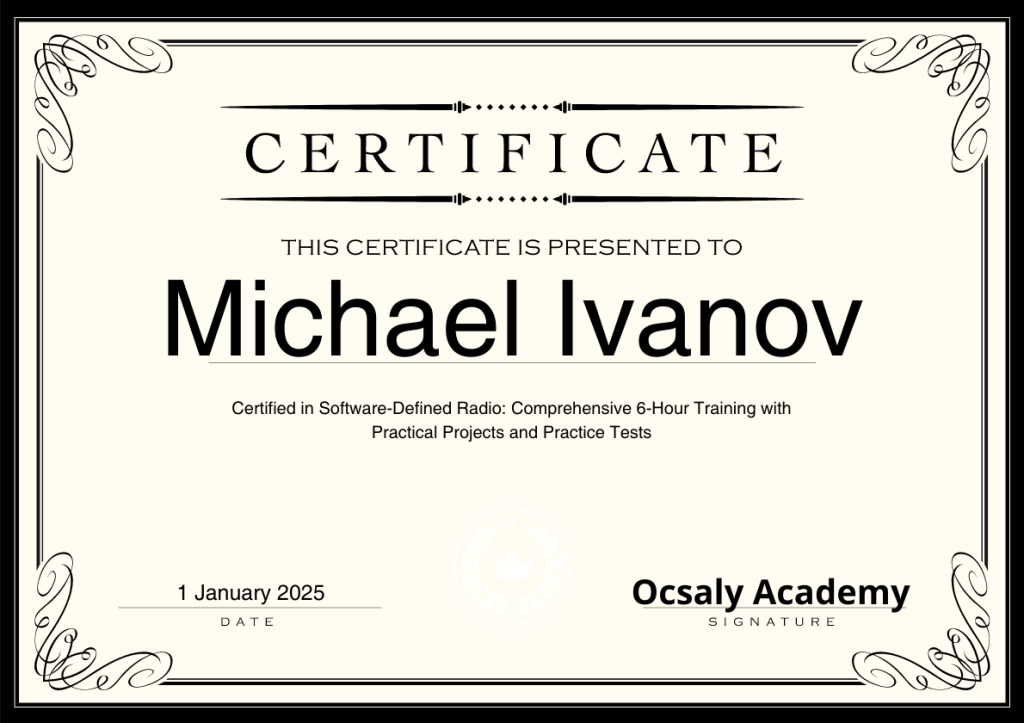In today’s interconnected world, wireless communication is everywhere, powering everything from your smartphone to cutting-edge IoT devices. But have you ever wondered how these signals are transmitted, processed, and decoded? Understanding these intricate processes isn’t just fascinating—it’s the foundation of some of the most exciting technologies of our time. That’s where Software-Defined Radio (SDR) comes in, and our comprehensive SDR training course is your ultimate guide.
This course is perfect for beginners eager to explore the wireless communication landscape and tech enthusiasts ready to level up their skills. Whether you’re interested in telecommunications, cybersecurity, or DIY electronics, this course has something valuable for everyone.
What’s in the Course?
Our course is designed to take you from a complete novice to a confident SDR user through carefully structured sections and engaging hands-on activities. Here’s what you’ll learn:
Section 1: Fundamentals of Radio and Signals
We start with the basics. You’ll explore what radio waves are, how signals are modulated, and the difference between analog and digital signals. These foundational topics will help you understand the language of wireless communication.
Section 2: Getting Started with GNU Radio
You’ll learn to install GNU Radio on Linux, Windows, or macOS and dive into its intuitive workspace. You’ll become familiar with blocks, sources, and sinks—essential components for building and analyzing SDR applications.
Section 3: Hands-On Projects
Put theory into practice by designing flowgraphs and manipulating properties using multipliers. This section sets the stage for tackling more complex SDR tasks.
Sections 4-9: Advanced Concepts and Real-World Applications
From building an AM receiver to mastering signal processing techniques like Fourier transforms and working with real-world SDR tools like RTL-SDR, HackRF, and SDR++, every lecture brings you closer to becoming a proficient SDR user.
We also cover crucial topics like filters, gains, decibel theory, and frequency shifting to help you fully grasp the mechanics of radio systems. You’ll even create an equalizer and explore different sound sample rates, making your learning both practical and creative.
Why Should You Join This Course?
- Practical, Hands-On Learning: Each lecture is designed to help you apply concepts directly through projects and exercises.
- Expert Tools: Gain real-world experience with industry-standard tools like GNU Radio, HackRF, and SDR++.
- Career-Ready Skills: Wireless communication is integral to fields like telecommunications, IoT, and cybersecurity. By mastering SDR, you’ll position yourself for exciting opportunities.
- Short, Accessible Lectures: The course is structured for maximum impact in less than two hours of video content, making it perfect for busy learners.
Why Learn SDR Now?
The demand for wireless technology skills has never been higher. With the rapid growth of 5G, IoT, and satellite communications, SDR expertise is a valuable asset. Whether you’re aiming for a career in tech or pursuing SDR as a hobby, this course equips you with the tools and knowledge to succeed.
Who Should Take This Course?
- Beginners: No prior experience? No problem! We start from scratch, making this course accessible to anyone interested in technology.
- Tech Enthusiasts: If you’re curious about how wireless devices work, this course will answer your questions and fuel your creativity.
- Students and Professionals: Aspiring engineers and professionals looking to upskill will find this course particularly rewarding.
Don’t Miss Out—Enroll Now!
By the end of this course, you’ll have the skills to decode radio signals, build flowgraphs, and work confidently with real-world SDR devices. Join a vibrant community of learners exploring the limitless possibilities of wireless communication. Don’t wait—click the link below and take the first step toward mastering SDR.
Wireless communication isn’t just the future; it’s the present. Equip yourself with the knowledge to shape it. Enroll today!

Example Certificate you’ll get:




